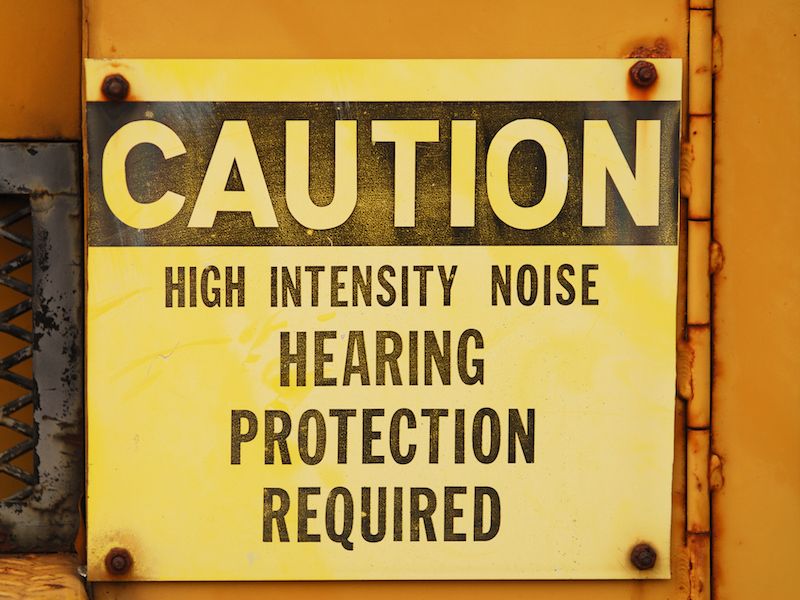
It’s one thing to realize that you should safeguard your hearing. Knowing when to protect your ears is a different story. It’s not as easy as, for example, determining when to wear sunscreen. (Are you going outdoors? Is there sunlight? You should be using sunscreen.) Even recognizing when you need eye protection is easier (Working with hazardous chemicals? Doing some construction? You need eye protection).
It can feel like there’s a significant grey area when dealing with when to wear ear protection, and that can be detrimental. Often, we’ll defer to our normal inclination to avoid hearing protection unless we’re given information that a specified place or activity is dangerous.
Risk Assessments
In general, we’re not very good at assessing risk, especially when it comes to something as intangible as permanent hearing problems or loss of hearing. Let’s take some examples to demonstrate the situation:
- Person A attends a very loud rock concert. 3 hours is around how long the concert lasts.
- Person B has a landscaping business. She spends a significant amount of time mowing lawns, then goes home to a quiet house and reads.
- Person C works in an office.
You may believe the hearing danger is greater for person A (let’s just call her Ann). Ann leaves the performance with her ears ringing, and she’ll spend the majority of the next day, trying to hear herself talk. It seems rational to assume that Ann’s activity was quite hazardous.
Person B (let’s just call her Betty), on the other hand, is exposed to less noise. Her ears don’t ring. So it must be safer for her hearing, right? Well, not really. Because Betty is mowing every day. In reality, the damage accumulates a little at a time even though they don’t ring out. If experienced too often, even moderately loud noise can have a harmful affect on your ears.
Person C (let’s call her Chris) is even less clear. Most people realize that you should safeguard your ears while running equipment like a lawnmower. But despite the fact that Chris has a fairly quiet job, her long morning commute through the city each day is fairly loud. Also, even though she works at her desk all day, she listens to her music through earbuds. Does she need to consider protection?
When You Should Worry About Safeguarding Your Hearing
In general, you should turn down the volume if you have to shout to be heard. And if your surroundings are that loud, you really should consider using earplugs or earmuffs.
So to put this a bit more scientifically, you need to use 85dB as your limit. Noises above 85dB have the ability to cause damage over time, so you need to give consideration to using hearing protection in those conditions.
Your ears don’t have their own decibel meter to alert you when you reach that 85dB level, so most hearing specialists recommend downloading specialized apps for your phone. You will be able to take the appropriate steps to protect your hearing because these apps will tell you when the sound is reaching a dangerous volume.
A Few Examples
Even if you do get that app and take it with you, your phone might not be with you wherever you go. So we may develop a good baseline with a few examples of when to safeguard our ears. Here we go:
- Residential Chores: We already mentioned how something as straightforward as mowing the lawn, when done frequently, can call for hearing protection. Cutting the grass is a good example of the kind of household chore that could cause damage to your hearing but that you most likely won’t think about all that often.
- Listening to music with earbuds. OK, this doesn’t call for protection but does require care. Give consideration to how loud the music is, how long you’re playing it, and whether it’s going directly into your ears. Consider using headphones that cancel out outside noise so you don’t have to turn up the volume to hazardous levels.
- Commuting and Driving: Driving all day as an Uber or Lyft driver? Or maybe you’re just hanging out downtown for work or getting on the subway. The noise of living in the city is bad enough for your ears, not to mention the extra injury caused by cranking up your tunes to drown out the city noise.
- Exercise: Your morning cycling class is a great example. Or even your nighttime Pilates session? Each of these examples might call for hearing protection. Those instructors who make use of microphones and sound systems (and loud music) to motivate you might be good for your heart rate, but all that loudness is bad for your hearing.
- Operating Power Tools: You recognize that working every day at your factory job is going to necessitate ear protection. But how about the hobbyist building in his workshop? Most hearing specialists will recommend you wear hearing protection when operating power tools, even if it’s only on a hobbyist level.
These examples may give you a suitable baseline. If there is any doubt, however, use protection. In most cases, it’s better to over-protect your ears than to leave them subject to possible harm in the future. Protect today, hear tomorrow.
